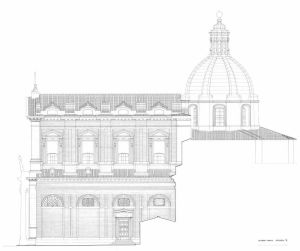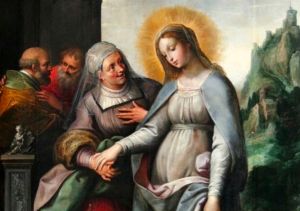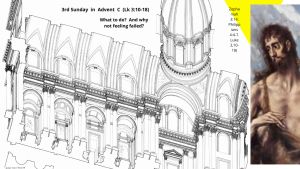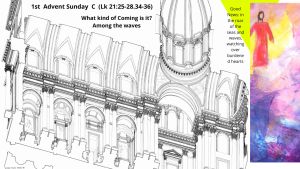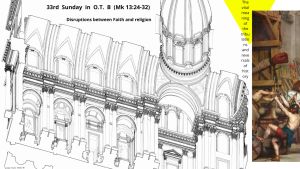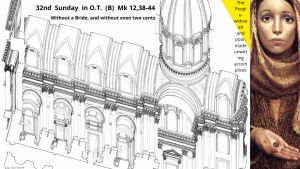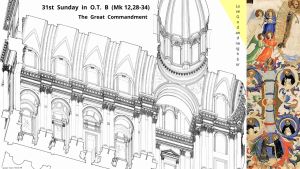
don Giuseppe Nespeca
Giuseppe Nespeca è architetto e sacerdote. Cultore della Sacra scrittura è autore della raccolta "Due Fuochi due Vie - Religione e Fede, Vangeli e Tao"; coautore del libro "Dialogo e Solstizio".
Christmas: Easter. Breathing for me
COMPLEXITIES OF EXISTENCE (by Francesco Giovannozzi, psychologist and psychotherapist)
The complexities of existence.
Life is not always easy and the complexities of existence have always existed; they accompany us along the path of our daily lives.
In times gone by, it was often the family doctor who listened to them and associated them as related to the health of his patients and gave them advice.
When, on the other hand, the difficulties were of an ethical nature, people turned to the priest who, through accompaniment and confession, gave suggestions on how to redeem themselves.
Later, with the discovery of psychology in its various forms, people became concerned with human problems. The figure of the psychologist in the broad sense or the psychiatrist joined the previous figures. As far as the field of the psychiatrist is concerned more specifically, the problems are not visible illnesses.
People who are afflicted by life complications are not patients in the usual sense. They can be normal, productive people - as normal as one can be in our community.
Generally, these daily contrarieties may concern interpersonal relationships, the way one works, performance issues... but also the issue of living honestly, in line with one's principles and personal beliefs. Then there are the contrarieties of practical life, which can often accentuate the others.
A lot also depends on our typical behaviours with which we defend ourselves or construct our way of life, and which were formed at an early period - unconsciously imitating people who had meaning in our lives (the so-called character, very succinctly).
Jung argues that the child's unconscious depends on the parental unconscious.
Almost always in my long professional practice I encountered this construct, and I had to struggle to make people understand that it was the parents who triggered the behaviour.
Often when I encountered parents who did not want to accept certain responsibilities, the latter would resort to excuses that did not hold up in any way.
In relationships between individuals, the most annoying issue concerns how we experience our affections.
There are aggressive people who seek people to dominate. There are those who exploit the other (the unwary); and so on.
In love relationships, one has to pay attention to how each one stands towards the other. Let us give some examples.
A woman who suffers because of her spouse who hinders her every development (or vice versa) must understand or be helped to understand that she has somehow sought this situation, and that it is only by finding confidence in her own possibilities and ability to manage herself that she will find relief from her pains.
Otherwise, i.e. if he does not discover his own potential, not even by separating will he solve his problems - because he will unconsciously seek the same kind of spouse.
Only people who are able to respect each other's needs and interests are capable of adult love. We often confuse our own desire with that of the other.
How many times in counselling with couples have I encountered this.
In job difficulties we often find people who move from one job to another because they are not satisfied with the lack of recognition. It may be, for example, an individual with grandiose ideas about his or her aptitudes who has to seek admiration in the work environment .
Then there are people who do creative work and feel that they do not produce as they would like. Here we are often faced with an unachievable perfectionism. Often such individuals are unable to admit that they have limits, and are confronted with their real capabilities.
It then happens that many people turn to an analyst because although they do not have a form of depression, they are not happy with themselves.
In his Psychoanalysis of Contemporary Society, Erich Fromm argues that consumerism leads us to an 'alienation from self'. By 'alienation' he means that which in principle belongs to man and then becomes foreign to him - eventually dominating us.
We must be as others want us to be.
Advertising and fashion itself also consciously influence us, and in this way if we do not conform we can feel backward.
We often get into conflict between our beliefs and the need to 'please' people.
Of course we do not have to be isolationists, but even here a proper balance 'saves' us, since repudiating certain fundamental tenets of our way of being does a lot of damage.
May the coming Christmas enlighten us, show us the way. Not infrequently, here too, we match current population trends, and often forget its true meaning.
Francesco Giovannozzi Psychologist-psychotherapist
Different Soul of Mary, in Visitation
What to do? Gaudete in Domino
Immaculate Conception: Personalism made safe
Advent: but what kind of Coming is it?
Jesus and Pilate: Truth about the King and the Man
Upheavals and things in place: between Faith and religion
Widow-people: without a Bride, and without even two pennies
Listen Israel: Love God and Neighbor
Path of Lent, learning a little more how to “ascend” with prayer and listen to Jesus and to “descend” with brotherly love, proclaiming Jesus (Pope Francis)
Itinerario della Quaresima, imparando un po’ di più a “salire” con la preghiera e ascoltare Gesù e a “scendere” con la carità fraterna, annunciando Gesù (Papa Francesco)
Anyone who welcomes the Lord into his life and loves him with all his heart is capable of a new beginning. He succeeds in doing God’s will: to bring about a new form of existence enlivened by love and destined for eternity (Pope Benedict)
Chi accoglie il Signore nella propria vita e lo ama con tutto il cuore è capace di un nuovo inizio. Riesce a compiere la volontà di Dio: realizzare una nuova forma di esistenza animata dall’amore e destinata all’eternità (Papa Benedetto)
You ought not, however, to be satisfied merely with knocking and seeking: to understand the things of God, what is absolutely necessary is oratio. For this reason, the Saviour told us not only: ‘Seek and you will find’, and ‘Knock and it shall be opened to you’, but also added, ‘Ask and you shall receive’ [Verbum Domini n.86; cit. Origen, Letter to Gregory]
Non ti devi però accontentare di bussare e di cercare: per comprendere le cose di Dio ti è assolutamente necessaria l’oratio. Proprio per esortarci ad essa il Salvatore ci ha detto non soltanto: “Cercate e troverete”, e “Bussate e vi sarà aperto”, ma ha aggiunto: “Chiedete e riceverete” [Verbum Domini n.86; cit. Origene, Lettera a Gregorio]
In the crucified Jesus, a kind of transformation and concentration of the signs occurs: he himself is the “sign of God” (John Paul II)
In Gesù crocifisso avviene come una trasformazione e concentrazione dei segni: è Lui stesso il "segno di Dio" (Giovanni Paolo II)
Only through Christ can we converse with God the Father as children, otherwise it is not possible, but in communion with the Son we can also say, as he did, “Abba”. In communion with Christ we can know God as our true Father. For this reason Christian prayer consists in looking constantly at Christ and in an ever new way, speaking to him, being with him in silence, listening to him, acting and suffering with him (Pope Benedict)
Solo in Cristo possiamo dialogare con Dio Padre come figli, altrimenti non è possibile, ma in comunione col Figlio possiamo anche dire noi come ha detto Lui: «Abbà». In comunione con Cristo possiamo conoscere Dio come Padre vero. Per questo la preghiera cristiana consiste nel guardare costantemente e in maniera sempre nuova a Cristo, parlare con Lui, stare in silenzio con Lui, ascoltarlo, agire e soffrire con Lui (Papa Benedetto)
In today’s Gospel passage, Jesus identifies himself not only with the king-shepherd, but also with the lost sheep, we can speak of a “double identity”: the king-shepherd, Jesus identifies also with the sheep: that is, with the least and most needy of his brothers and sisters […] And let us return home only with this phrase: “I was present there. Thank you!”. Or: “You forgot about me” (Pope Francis)
Nella pagina evangelica di oggi, Gesù si identifica non solo col re-pastore, ma anche con le pecore perdute. Potremmo parlare come di una “doppia identità”: il re-pastore, Gesù, si identifica anche con le pecore, cioè con i fratelli più piccoli e bisognosi […] E torniamo a casa soltanto con questa frase: “Io ero presente lì. Grazie!” oppure: “Ti sei scordato di me” (Papa Francesco)
duevie.art
don Giuseppe Nespeca
Tel. 333-1329741
Disclaimer
Questo blog non rappresenta una testata giornalistica in quanto viene aggiornato senza alcuna periodicità. Non può pertanto considerarsi un prodotto editoriale ai sensi della legge N°62 del 07/03/2001.
Le immagini sono tratte da internet, ma se il loro uso violasse diritti d'autore, lo si comunichi all'autore del blog che provvederà alla loro pronta rimozione.
L'autore dichiara di non essere responsabile dei commenti lasciati nei post. Eventuali commenti dei lettori, lesivi dell'immagine o dell'onorabilità di persone terze, il cui contenuto fosse ritenuto non idoneo alla pubblicazione verranno insindacabilmente rimossi.



